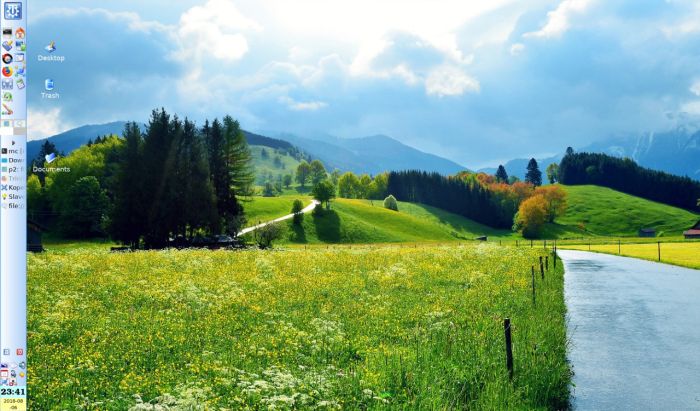Last Updated on January 5, 2025
The Trinity Desktop Environment (TDE) project is a computer desktop environment for Unix-like operating systems with a primary goal of retaining the function and form of traditional desktop computers.
TDE was born as a fork of the K Desktop Environment version 3.5, which was originally written by the KDE Team, a world-wide network of software engineers committed to Free Software development. The name Trinity was chosen because the word means Three as in continuation of KDE 3.
Since then, TDE has evolved to be an independent and standalone desktop environment project.
Features include:
- A repository of TDE compatible software applications.
- Traditional panel, task bar, task manager, quick launch.
- Several text editors, file manager, image viewers, office apps, archive manager.
- The original and improved classic Amarok music player.
- A comprehensive control center to configure the desktop to each user’s preferences.
- Monitor and Display control center module for system wide single/multi monitor and display configuration.
- TDE Run dialog supports autocompletion and history-based autocompletion.
- Customizable System Tray icon sizes.
- Remote Folder Synchronization in Konqueror file manager.
- ICC (International Color Consortium) color profile support.
- Searchable system menu.
- Kickoff style system menu support.
- SmartCard support.
- Supports GTK2/Qt theme engine; tabs, check boxes, menu backgrounds.
- Optional Secure Attention Key to further secure the login and desktop lock dialogs.
- A built-in X11 compositor.
- Some TDE applications, such as Amarok, detect and use true RGBA (Red Green Blue Alpha) transparency when available.
- A TDE-specific DBUS notification client for improved integration with common applications such as Firefox and NetworkManager (not dependent on HAL).
- Prevent OpenGL screen savers from locking the display.
- Support for FreeBSD.
Website: www.trinitydesktop.org
Support: Documentation, Wiki, Mailing Lists
Developer: TDE Team
License: GNU GPL and other licenses

TDE is written in C++. Learn C++ with our recommended free books and free tutorials.
Return to Desktop Environments Home Page
| Popular series | |
|---|---|
| The largest compilation of the best free and open source software in the universe. Each article is supplied with a legendary ratings chart helping you to make informed decisions. | |
| Hundreds of in-depth reviews offering our unbiased and expert opinion on software. We offer helpful and impartial information. | |
| The Big List of Active Linux Distros is a large compilation of actively developed Linux distributions. | |
| Replace proprietary software with open source alternatives: Google, Microsoft, Apple, Adobe, IBM, Autodesk, Oracle, Atlassian, Corel, Cisco, Intuit, SAS, Progress, Salesforce, and Citrix | |
| Awesome Free Linux Games Tools showcases a series of tools that making gaming on Linux a more pleasurable experience. This is a new series. | |
| Machine Learning explores practical applications of machine learning and deep learning from a Linux perspective. We've written reviews of more than 40 self-hosted apps. All are free and open source. | |
| New to Linux? Read our Linux for Starters series. We start right at the basics and teach you everything you need to know to get started with Linux. | |
| Alternatives to popular CLI tools showcases essential tools that are modern replacements for core Linux utilities. | |
| Essential Linux system tools focuses on small, indispensable utilities, useful for system administrators as well as regular users. | |
| Linux utilities to maximise your productivity. Small, indispensable tools, useful for anyone running a Linux machine. | |
| Surveys popular streaming services from a Linux perspective: Amazon Music Unlimited, Myuzi, Spotify, Deezer, Tidal. | |
| Saving Money with Linux looks at how you can reduce your energy bills running Linux. | |
| Home computers became commonplace in the 1980s. Emulate home computers including the Commodore 64, Amiga, Atari ST, ZX81, Amstrad CPC, and ZX Spectrum. | |
| Now and Then examines how promising open source software fared over the years. It can be a bumpy ride. | |
| Linux at Home looks at a range of home activities where Linux can play its part, making the most of our time at home, keeping active and engaged. | |
| Linux Candy reveals the lighter side of Linux. Have some fun and escape from the daily drudgery. | |
| Getting Started with Docker helps you master Docker, a set of platform as a service products that delivers software in packages called containers. | |
| Best Free Android Apps. We showcase free Android apps that are definitely worth downloading. There's a strict eligibility criteria for inclusion in this series. | |
| These best free books accelerate your learning of every programming language. Learn a new language today! | |
| These free tutorials offer the perfect tonic to our free programming books series. | |
| Linux Around The World showcases usergroups that are relevant to Linux enthusiasts. Great ways to meet up with fellow enthusiasts. | |
| Stars and Stripes is an occasional series looking at the impact of Linux in the USA. | |